上外版(2020) 必修第二册 Unit 3 Food ReadingA 课件-(19张ppt)
文档属性
| 名称 | 上外版(2020) 必修第二册 Unit 3 Food ReadingA 课件-(19张ppt) |
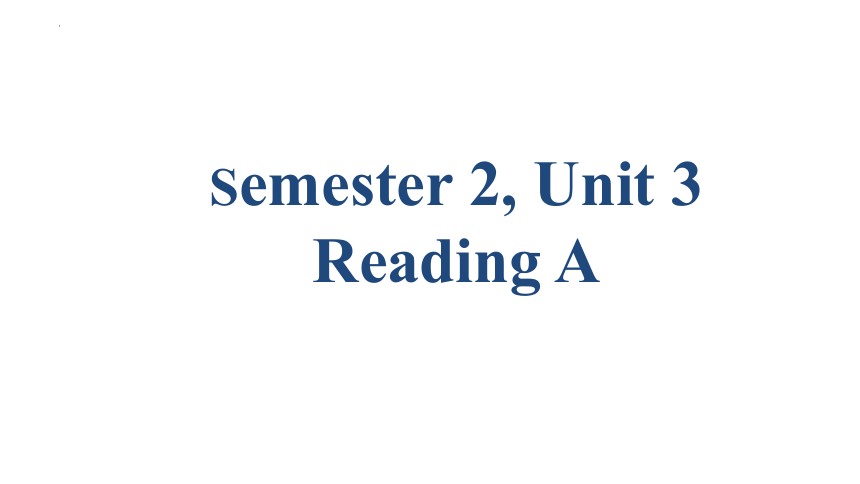
|
|
| 格式 | pptx | ||
| 文件大小 | 307.0KB | ||
| 资源类型 | 教案 | ||
| 版本资源 | 上外版(2020) | ||
| 科目 | 英语 | ||
| 更新时间 | 2022-10-12 16:31:21 | ||
图片预览

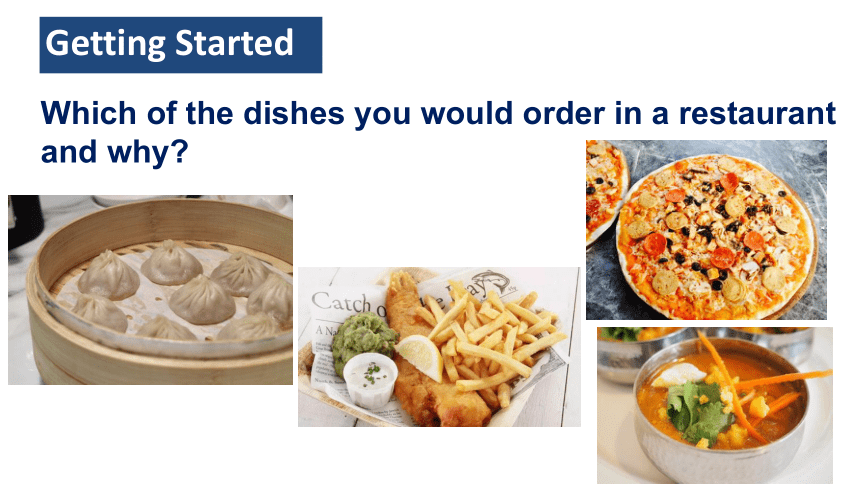
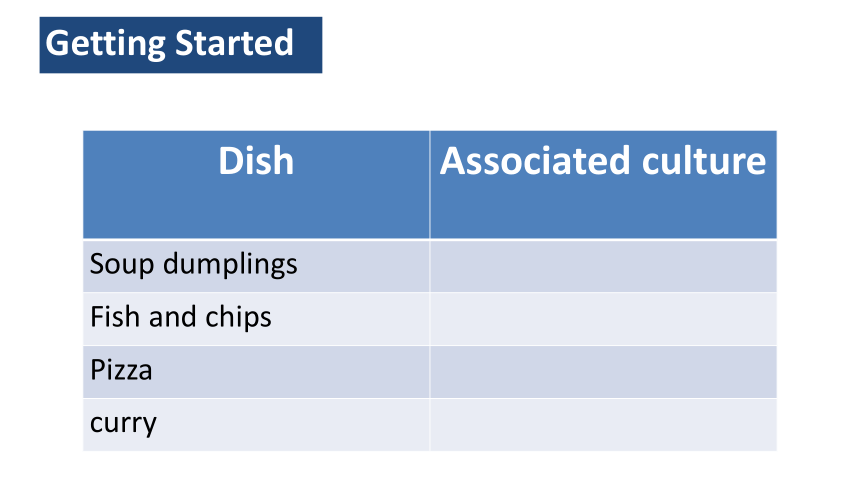
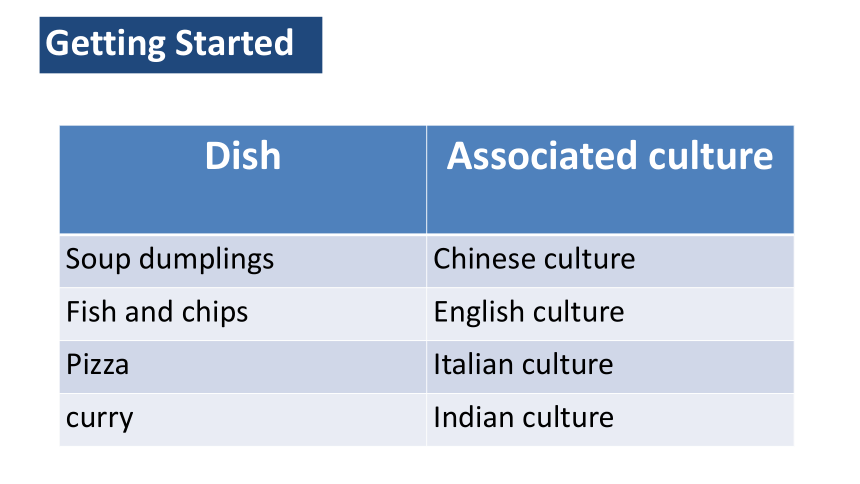
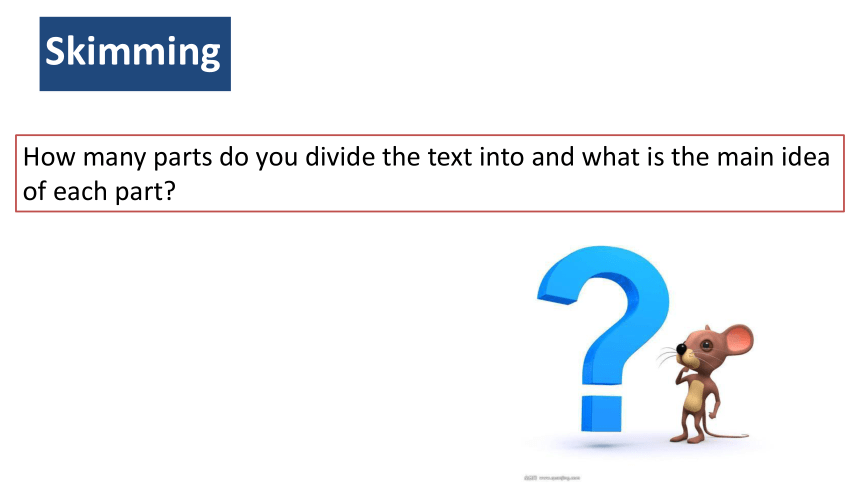
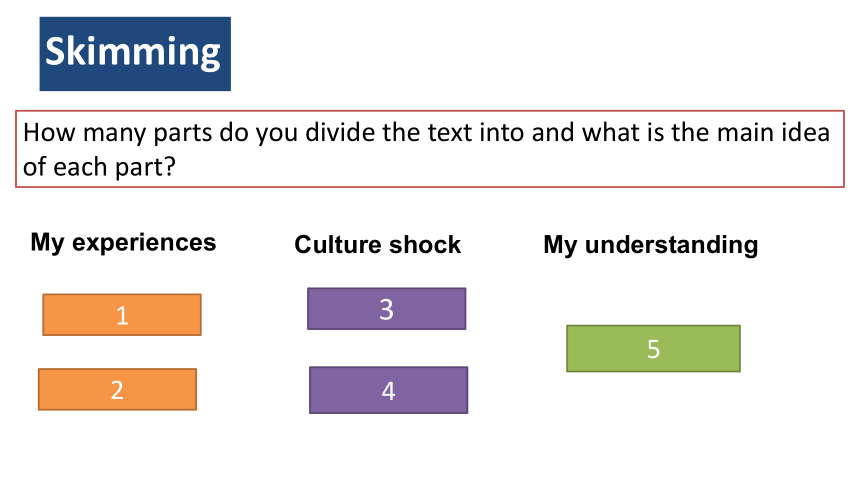
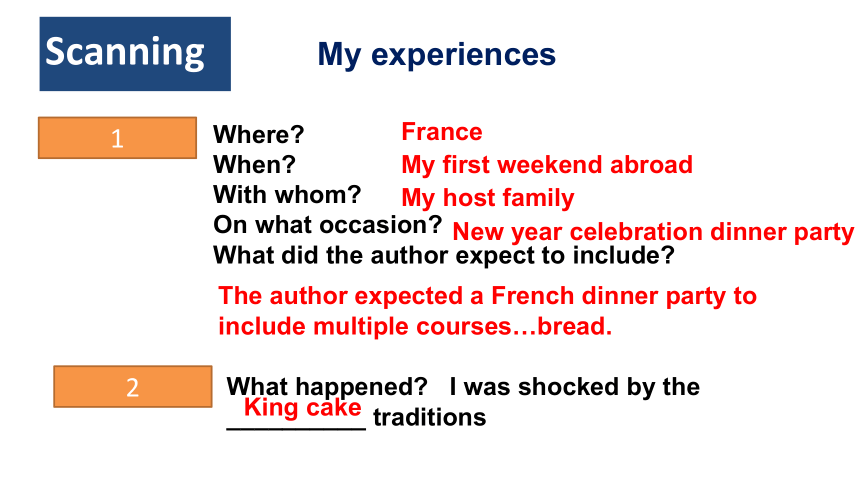
文档简介
(共19张PPT)
Semester 2, Unit 3
Reading A
Getting Started
Which of the dishes you would order in a restaurant and why
Getting Started
Dish Associated culture
Soup dumplings
Fish and chips
Pizza
curry
Getting Started
Dish Associated culture
Soup dumplings Chinese culture
Fish and chips English culture
Pizza Italian culture
curry Indian culture
Skimming
How many parts do you divide the text into and what is the main idea of each part
Skimming
How many parts do you divide the text into and what is the main idea of each part
1
3
5
2
My experiences
Culture shock
My understanding
4
Scanning
1
2
My experiences
Where
When
With whom
On what occasion
What did the author expect to include
France
My first weekend abroad
My host family
New year celebration dinner party
The author expected a French dinner party to include multiple courses…bread.
What happened I was shocked by the __________ traditions
King cake
Scanning
3
Culture shock
4
What is it
The feeling of __________ in a new country when you’re __________ things that may be __________ to you
confusion
adjusting to
unfamiliar
What do “ups and downs”and“highs and lows”refer to?
The ups and highs refer to __________ phase, where __________ , while the downs and lows refer to __________, where __________ .
Strategies from the International Programs Office:
To understand culture shock and its different phases
Skimming
5
My understanding
Make a list of the cultural differences regarding food and dinning between France and the author’s home country according to the text.
In France In the author’s home country
There are the “king cake” traditions There are no such traditions
The French eat with both wrists resting on the table
Many Americans tend to keep their left hands in their lap while eating
The French often use bread as a utensil
Bread is not used as a utensil
The French often say “Bon appetit” before eating
People rarely say this before eating
Skimming
Where does the author most probably come from
Explain your answer with reference to the text.
The author probably comes from America, for in the last paragraph, she compares the French dinning culture to the American one.
Homework:
1. Read aloud the article at least 3 times.
2. Read the rest of the article in the newspaper.
---Look up the dictionary and take notes about the new words.
3. Write your paragraph in the format that we have learned today.
Vocabulary and expressions
multiple adj. 数量多的;多种多样的
他死于多处受伤。
He died of multiple injuries.
call out 喊;叫;大声说出;
Vocabulary and expressions
slice
1. n. (指食物切下的)片,薄片
每天尽量至少吃 4 片面包。
Try to eat at least four slices of bread a day.
2. v. 将…切成薄片
海伦把蛋糕切成片。
Helen sliced the cake.
Vocabulary and expressions
take sb by surprise 出乎某人意料
from time to time / once in a while/ occasionally 偶尔;有时
Vocabulary and expressions
confusion
1 ~ (about/over sth) 不确定;困惑
对于应该采取什么正确步骤,还是有些不明确。
There is some confusion about what the correct procedure should be.
2 ~ (between A and B) 混淆;
为避免搞错,请在孩子所有的校服上写清楚他们的姓名。
To avoid confusion, please write the children's names clearly on all their school clothes.
3 in ~ 困窘;尴尬;局促不安
他困窘地看着我,没有回答问题。
He looked at me in confusion and did not answer the question.
Vocabulary and expressions
adjust
1 ~ sth (to sth) 调整;调节
要根据听众的年龄使用相应的语言。
2 ~ (to sth/to doing sth) | ~ (oneself to sth) 适应;习惯 = adapt
她过了一段时间才适应独自生活。
It took her a while to adjust to living alone.
3 整理
Adjust the tie
Adjust your language to the age of your audience.
Vocabulary and expressions
run into
1. 遇到(问题、困难等);陷入(困境);
~/encounter/face problems or difficulties
2. 偶遇;碰到;
~/encounter/ come across / ~sb
3. (车辆)意外撞上;
ups and downs 兴衰;浮沉;起落;悲欢
每一段感情都有许多起伏。
Every relationship has a lot of ups and downs.
Vocabulary and expressions
illustrate v.
~ sth (with sth) 加插图于;给(书等)做图表
他在讲演中使用了幻灯片。
His lecture was illustrated with slides.
2.(用示例、图画等)说明,解释
为了说明我的观点,让我来给你们讲个小故事。
To illustrate my point , let me tell you a little story.
Vocabulary and expressions
tend to do 往往
大部分中国学生往往会利用劳动节假期来参加志愿活动。
The most majority of Chinese students often use the Labor Day holiday to participate in voluntary activities.
utensil n. (家庭)用具,器皿;家什
kitchen ~ 厨房用具
Semester 2, Unit 3
Reading A
Getting Started
Which of the dishes you would order in a restaurant and why
Getting Started
Dish Associated culture
Soup dumplings
Fish and chips
Pizza
curry
Getting Started
Dish Associated culture
Soup dumplings Chinese culture
Fish and chips English culture
Pizza Italian culture
curry Indian culture
Skimming
How many parts do you divide the text into and what is the main idea of each part
Skimming
How many parts do you divide the text into and what is the main idea of each part
1
3
5
2
My experiences
Culture shock
My understanding
4
Scanning
1
2
My experiences
Where
When
With whom
On what occasion
What did the author expect to include
France
My first weekend abroad
My host family
New year celebration dinner party
The author expected a French dinner party to include multiple courses…bread.
What happened I was shocked by the __________ traditions
King cake
Scanning
3
Culture shock
4
What is it
The feeling of __________ in a new country when you’re __________ things that may be __________ to you
confusion
adjusting to
unfamiliar
What do “ups and downs”and“highs and lows”refer to?
The ups and highs refer to __________ phase, where __________ , while the downs and lows refer to __________, where __________ .
Strategies from the International Programs Office:
To understand culture shock and its different phases
Skimming
5
My understanding
Make a list of the cultural differences regarding food and dinning between France and the author’s home country according to the text.
In France In the author’s home country
There are the “king cake” traditions There are no such traditions
The French eat with both wrists resting on the table
Many Americans tend to keep their left hands in their lap while eating
The French often use bread as a utensil
Bread is not used as a utensil
The French often say “Bon appetit” before eating
People rarely say this before eating
Skimming
Where does the author most probably come from
Explain your answer with reference to the text.
The author probably comes from America, for in the last paragraph, she compares the French dinning culture to the American one.
Homework:
1. Read aloud the article at least 3 times.
2. Read the rest of the article in the newspaper.
---Look up the dictionary and take notes about the new words.
3. Write your paragraph in the format that we have learned today.
Vocabulary and expressions
multiple adj. 数量多的;多种多样的
他死于多处受伤。
He died of multiple injuries.
call out 喊;叫;大声说出;
Vocabulary and expressions
slice
1. n. (指食物切下的)片,薄片
每天尽量至少吃 4 片面包。
Try to eat at least four slices of bread a day.
2. v. 将…切成薄片
海伦把蛋糕切成片。
Helen sliced the cake.
Vocabulary and expressions
take sb by surprise 出乎某人意料
from time to time / once in a while/ occasionally 偶尔;有时
Vocabulary and expressions
confusion
1 ~ (about/over sth) 不确定;困惑
对于应该采取什么正确步骤,还是有些不明确。
There is some confusion about what the correct procedure should be.
2 ~ (between A and B) 混淆;
为避免搞错,请在孩子所有的校服上写清楚他们的姓名。
To avoid confusion, please write the children's names clearly on all their school clothes.
3 in ~ 困窘;尴尬;局促不安
他困窘地看着我,没有回答问题。
He looked at me in confusion and did not answer the question.
Vocabulary and expressions
adjust
1 ~ sth (to sth) 调整;调节
要根据听众的年龄使用相应的语言。
2 ~ (to sth/to doing sth) | ~ (oneself to sth) 适应;习惯 = adapt
她过了一段时间才适应独自生活。
It took her a while to adjust to living alone.
3 整理
Adjust the tie
Adjust your language to the age of your audience.
Vocabulary and expressions
run into
1. 遇到(问题、困难等);陷入(困境);
~/encounter/face problems or difficulties
2. 偶遇;碰到;
~/encounter/ come across / ~sb
3. (车辆)意外撞上;
ups and downs 兴衰;浮沉;起落;悲欢
每一段感情都有许多起伏。
Every relationship has a lot of ups and downs.
Vocabulary and expressions
illustrate v.
~ sth (with sth) 加插图于;给(书等)做图表
他在讲演中使用了幻灯片。
His lecture was illustrated with slides.
2.(用示例、图画等)说明,解释
为了说明我的观点,让我来给你们讲个小故事。
To illustrate my point , let me tell you a little story.
Vocabulary and expressions
tend to do 往往
大部分中国学生往往会利用劳动节假期来参加志愿活动。
The most majority of Chinese students often use the Labor Day holiday to participate in voluntary activities.
utensil n. (家庭)用具,器皿;家什
kitchen ~ 厨房用具
